 Leo Goldsmith
Leo Goldsmith
Against a strikingly mercurial score, something wayward this way comes in the latest film by Ryûsuke Hamaguchi.
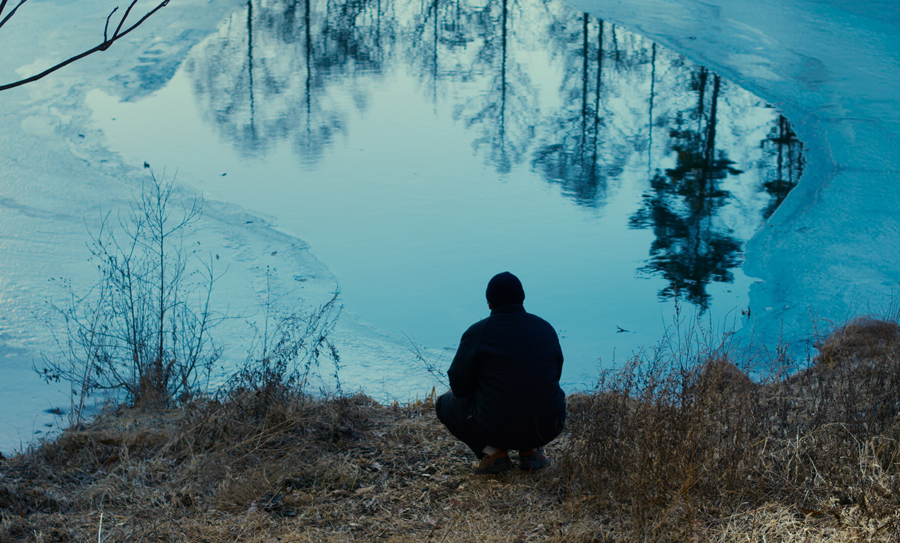
Hitoshi Omika as Takumi in Evil Does Not Exist. Courtesy Cinetic Media.
Evil Does Not Exist, written and directed by Ryûsuke Hamaguchi, opens in New York theaters May 3, 2024
• • •
“Seeing is difficult,” states Shiguéhiko Hasumi in his 1983 monograph Directed by Yasujirō Ozu. A deeply influential figure in the Japanese film world, Hasumi remains largely unknown in the West—his book on Ozu was published in English only this year, among the first of his works available to the Anglophone world. A scholar of Flaubert who also helped to introduce French post-structuralism to Japan, Hasumi is known for a controversial approach to cinema that he called “surface criticism,” which rejects the tendency to read films through the recourse to metaphor and cultural interpretation. In his book on Ozu, Hasumi challenges both Western commentators on the filmmaker as well as Japanese critics who emphasize the cultural specificity of Ozu’s oeuvre, endorsing a more careful attention to the “limitlessly open” meanings of Ozu’s images themselves: “in cinema, the tendency to overread often corresponds to the poverty of what one has seen.” As the ’60s underground doyen Jack Smith said in his catty appreciation of Josef von Sternberg: “Your eye if you could use it told you more interesting things.” For Hasumi, we are simply not looking carefully enough.

Ryô Nishikawa as Hana in Evil Does Not Exist. Courtesy Cinetic Media.
Looking carefully won’t necessarily reveal all the mysteries in Evil Does Not Exist, the dark, elusive new film by Ryûsuke Hamaguchi, an avowed Hasumi acolyte. While Hamaguchi’s films tend to explore relatively quotidian situations—quarrels and quandaries in the workplace, the home, and other corners of contemporary middle-class Japanese life—they are nonetheless deceptive and mercurial, seemingly designed to frustrate distracted viewers with their gently misleading plotlines and occasionally abrupt shifts in tonal register. Blink and you’ll miss a character’s curious U-turn, change of heart, or sudden disappearance. These fluctuations occur in nearly every scene during the five-plus hours of Happy Hour: the four women at the film’s center squabble, reveal secrets, separate from their partners, and reconcile again. Hamaguchi’s Oscar-winning Drive My Car seems like a straightforward art-house specimen, with its reassuringly popular points of reference: Murakami, Chekhov, the Beatles. But it culminates in a sequence of unexpected climaxes and mood swings that unravels and then reknits the tightly constructed narrative that has preceded it. There is a waywardness to Hamaguchi’s films that belies their sense of rigor and precision, as if they were as open to contingency as their fickle characters.
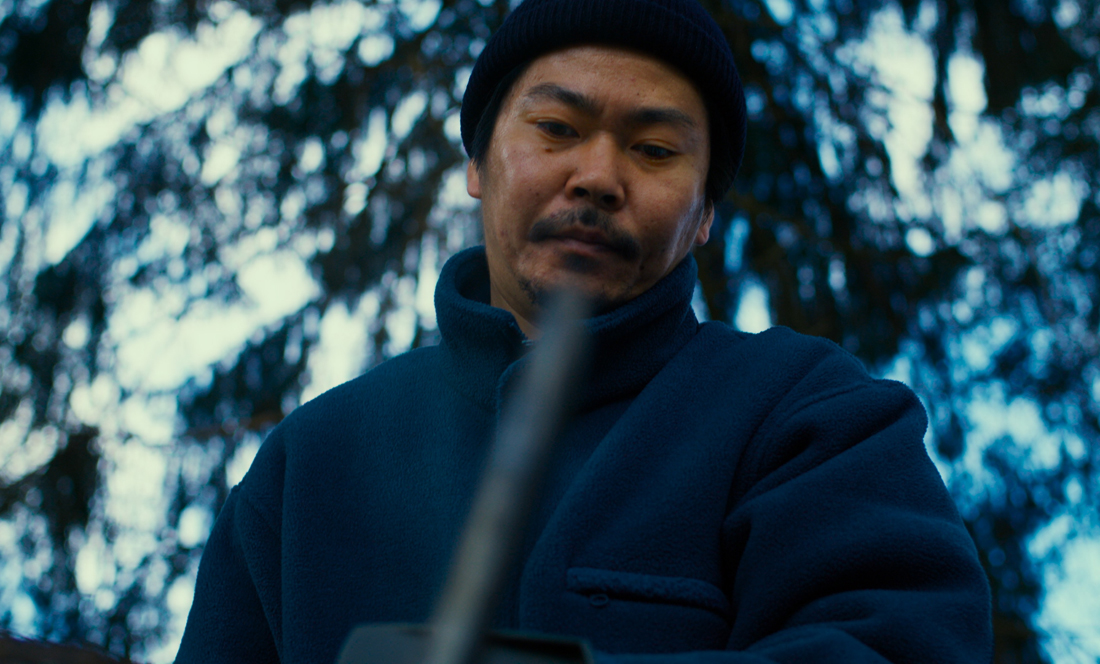
Hitoshi Omika as Takumi in Evil Does Not Exist. Courtesy Cinetic Media.
Evil immediately throws the viewer off the scent with its weighty, inapposite title—actually a Christian koan from St. Augustine—and its bucolic setting: a wooded region a couple hours’ drive from Tokyo, a change from the director’s previous films, which tend to be set in and around cities. Here we find eight-year-old Hana (Ryô Nishikawa), gazing up at the forest canopy, and her forgetful, taciturn father, Takumi, a self-described “odd-jobs man” and a widower, assiduously chainsawing a log for firewood. Played by Hitoshi Omika—who has worked with the director as a production manager and had little acting experience prior to Evil—Takumi is somehow even more impassive than Hamaguchi’s previous male characters, performing every minor chore (wielding an axe, collecting water from a spring, smoking a cigarette) with extreme deliberation. He even seems to blink slowly. When representatives of a Tokyo firm arrive to propose the construction of a glamping site in the region, we immediately sketch a set of presumptive contrasts: between our Nature Boy and urban interlopers, between tradition and modernity, between good and evil.
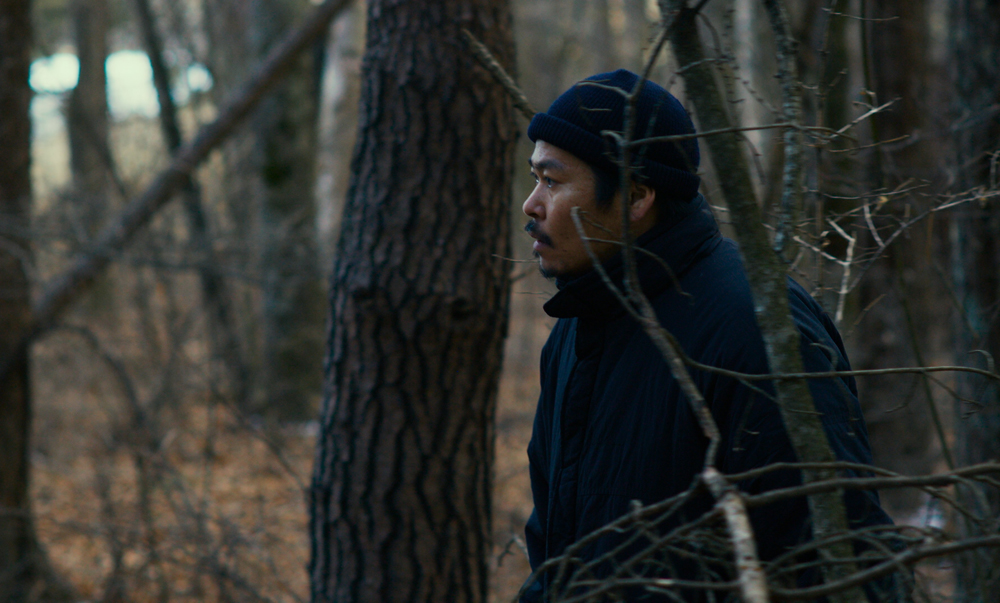
Hitoshi Omika as Takumi in Evil Does Not Exist. Courtesy Cinetic Media.
An early clue that all is not as it seems comes by way of the score, composed by multi-instrumentalist Eiko Ishibashi. In the first moments of the film, the music pivots from a slightly cheeseball light jazz to oneiric ambient synth to lush strings, wavering in and out of dissonance. Her work often seems to hover between genres: the velvety, almost whimsical soundtrack she composed for Drive My Car, combining a raucously jazzy shuffle and heavy use of melodica and vibraphone, misdirects the ear with its lightness and hint of sentimentality. In Evil, the soundtrack is even harder to pin down: accompanying a low-angle tracking shot of the trees above (we eventually take this to be Hana’s point of view), the music is strikingly equivocal in tone, teasing at once the sublime and the anxious. Without warning—in a move he’ll go on to repeat—Hamaguchi suddenly cuts the score, an abrupt rupture that makes its moods even more illegible.
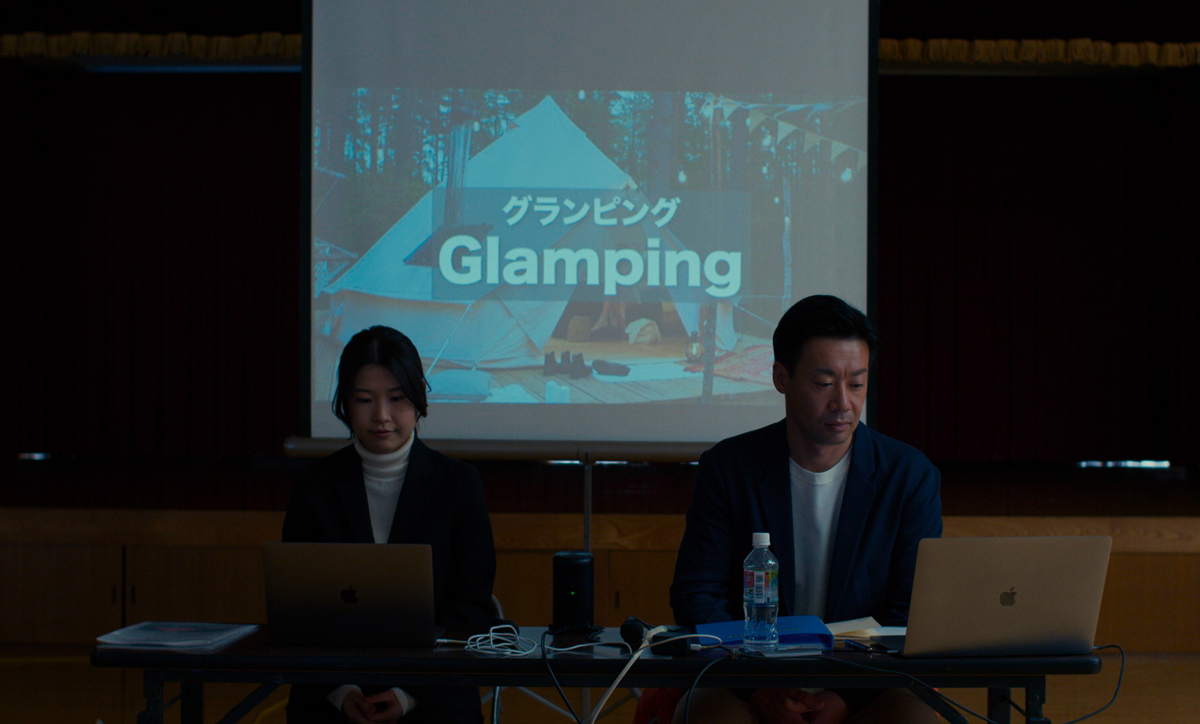
Ayaka Shibutani as Mayuzumi and Ryûji Kosaka as Takahashi in Evil Does Not Exist. Courtesy Cinetic Media.
Listening is difficult, too. And it becomes increasingly important as the film proceeds, as the representatives for the glamping project convene a town meeting to discuss their prospectus. The proceedings quickly turn awkward: the plan is rushed and half-baked, the brainchild of Playmode, whose CEO is trying to cash in on government-issued COVID subsidies. The company has given little consideration to the impact its facilities, including an insufficient septic tank, will have on the habitat and the local water supply. Of the firm’s two representatives, the galumphing Takahashi (Ryûji Kosaka) immediately alienates the members of the community with corporate jargon and empty platitudes: “We believe this project is mutually beneficial.” His partner, Mayuzumi—played by Ayaka Shibutani, who memorably portrayed the excessively apologetic nurse-in-training Yuzuki in Happy Hour—is more deferential, promising to learn from the villagers’ wisdom. And, amazingly, it is Takumi who offers an affectless olive branch: the region’s history is actually quite short—“all of us are outsiders”—and if the project is planned well, the residents will help the Playmode reps realize it. “Balance is key,” Takumi says.
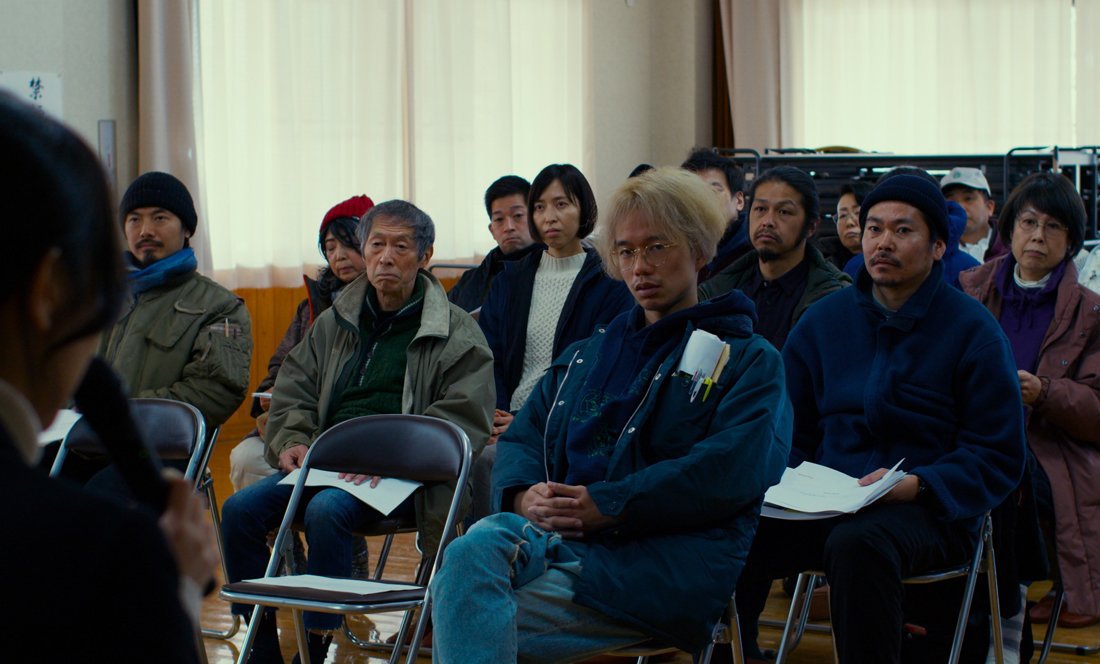
Hitoshi Omika as Takumi (far right) and cast in Evil Does Not Exist. Courtesy Cinetic Media.
It’s worth noting that, in contrast to the usual order of operations, it was Ishibashi’s music that prompted Hamaguchi’s movie, not the other way around. Commissioned to create a series of live concerts to be accompanied by images, she asked the director to make a film. Rather than provide abstract imagery, he wrote a screenplay instead, setting it in the region where Ishibashi and her partner-collaborator Jim O’Rourke live and work. Evil is the feature-film version; Ishibashi has since toured with a dialogue-less version of the same material, under the title Gift. This word—rather than the movie’s actual name, which Hamaguchi himself has confessed is somewhat tangential—offers a hint to the increasingly baffling second half.

Hitoshi Omika as Takumi and Ryô Nishikawa as Hana in Evil Does Not Exist. Courtesy Cinetic Media.
With the kind of attention to the image Hasumi advocates, we might notice the film’s repeated gestures of gift-giving and mutual aid. Takumi’s entire vocation seems to be one of unremunerated assistance: supplying the local soba restaurant with spring water, gleaning pheasant quills from the forest to give to the village elder, even buying the two Playmode employees lunch and consenting to give free (if largely monosyllabic) advice. Takumi is enmeshed in networks of exchange, reciprocity, and care, depending upon the human and nonhuman systems around him and operating entirely outside the capitalist extraction of natural and public resources that Playmode represents. Balance is key—and when that balance is disturbed, anything is possible.
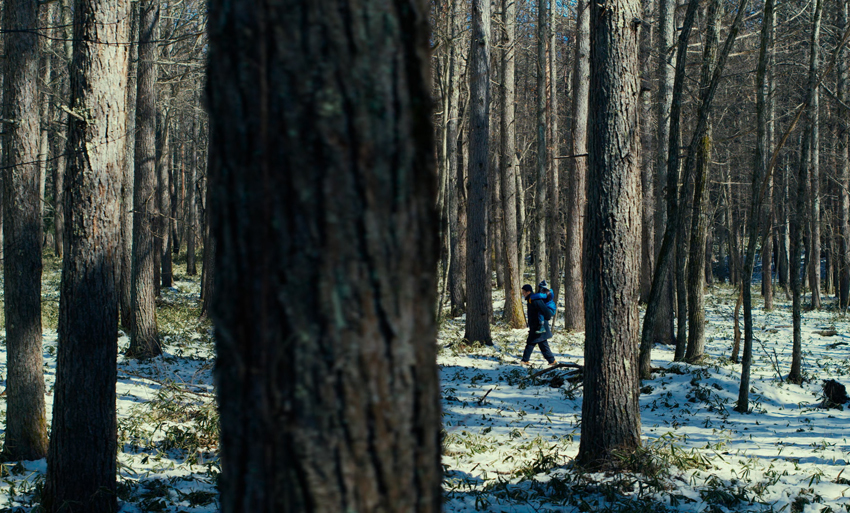
Hitoshi Omika as Takumi and Ryô Nishikawa as Hana in Evil Does Not Exist. Courtesy Cinetic Media.
That Ishibashi has described Evil as Hamaguchi’s angriest film might offer some clues, too. What initially reads as serene pastoral countryside is increasingly, subtly undercut by Yoshio Kitagawa’s economical, occasionally even raw cinematography: long lateral tracks through the woods recall something of the bright, uncanny flatness of Twin Peaks’ third season. All the usual romantic connotations of the setting disappear into a literal and metaphorical fog in the film’s final scene, in an extreme gesture that confounds description as much as expectation. In this moment, Hamaguchi challenges us to look more closely, even as the frame fills with darkness and mist.
Leo Goldsmith is a writer, teacher, and curator based in Brooklyn.